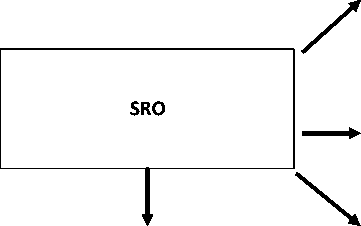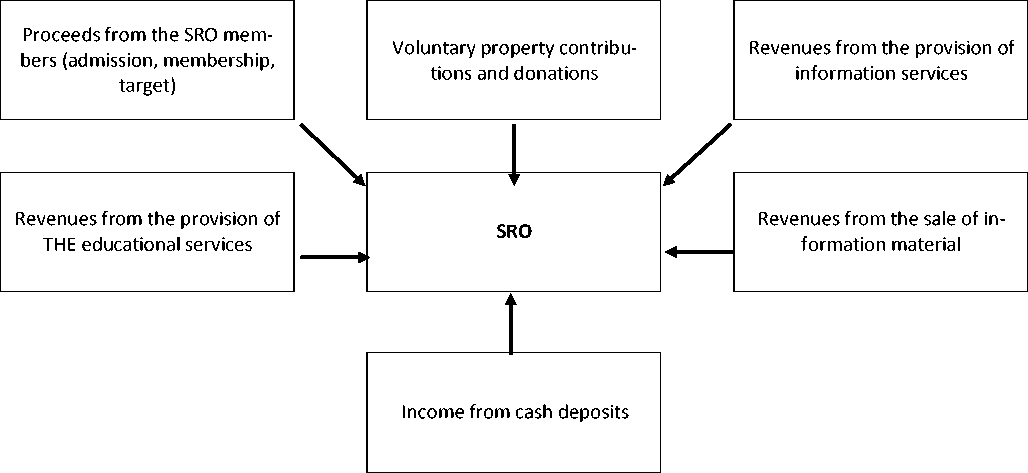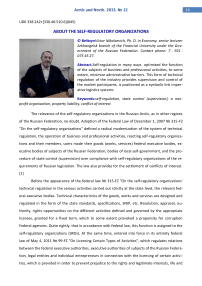About the self-regulatory organizations
Автор: Belitsyn V.N.
Журнал: Arctic and North @arctic-and-north
Рубрика: Regionology of Arctic and North: management, economy, society, culture
Статья в выпуске: 12, 2013 года.
Бесплатный доступ
Self-regulation in many ways optimized the function of the subjects of business and professional activities, to some extent, minimize administrative barriers. This form of technical regulation of the industry provides supervision and control of the market participants, is positioned as a symbolic link imperative logistics systems.
Self-regulation, state control (supervision), a nonprofit organization, property liability, conflict of interest
Короткий адрес: https://sciup.org/148319906
IDR: 148319906 | УДК: 338.242+[330.46:510.6](045)
Текст научной статьи About the self-regulatory organizations
The relevance of the self-regulatory organizations in the Russian Arctic, as in other regions of the Russian Federation, no doubt. Adoption of the Federal Law of December 1, 2007 № 315-FZ "On the self-regulatory organizations" defined a radical modernization of the system of technical regulation, the operation of business and professional activities, reacting self-regulatory organizations and their members, users made their goods (works, services) federal executive bodies, executive bodies of subjects of the Russian Federation, bodies of local self-government, and the procedure of state control (supervision) over compliance with self-regulatory organizations of the requirements of Russian legislation. The law also provides for the settlement of conflicts of interest. [1]
Before the appearance of the federal law № 315-FZ "On the self-regulatory organizations' technical regulation in the various activities carried out strictly at the state level, the relevant federal executive bodies. Technical characteristics of the goods, works and services are designed and regulated in the form of the state standards, specifications, SNIP, etc. Resolution, approval, a u-thority, rights opportunities on the different activities defined and governed by the appropriate licenses, granted for a fixed term, which to some extent provoked a propensity for corruption Federal agencies. Quite rightly, that in accordance with federal law, this function is assigned to the self-regulatory organizations (SROs). At the same time, entered into force in its entirety federal law of May 4, 2011 № 99-FZ "On Licensing Certain Types of Activities", which regulates relations between the federal executive authorities, executive authorities of subjects of the Russian Federation, legal entities and individual entrepreneurs in connection with the licensing of certain activities, which is provided in order to prevent prejudice to the rights and legitimate interests, life and health, the environment, cultural heritage (monuments of history and culture), defense and security, the possibility of the application of which is associated with implementation of legal entities and individual entrepreneurs selected activities [2]. Under the licensing in Russia are 49 activities. The licenses will be valid indefinitely. A separate provision in the law spelled out on the inadmissibility of charging business license fees. The only fee - officially established state duty. Simplified licensing procedure: from 1 July 2012 applicants may submit license applications and documents for obtaining and renewal of the permits in the electronic form. The Act also stimulates: the implementation of the licensing of the certain activities for other purposes is not permitted.
In addition, the effect of the federal law does not apply to the self-regulatory organization of the securities market, joint-stock investment funds, management companies and specialized depositories and investment funds, mutual and pension funds, pension funds, credit institutions, credit bureaus.
The legislation is meant by self-regulation and self-initiative activity which is carried out by the business entities or the professional activity and the content of which is the development and establishment of the standards and regulations of such activities, as well as monitoring compliance with the requirements of these standards and regulations. The main functions of the SRO are shown in Scheme 1.
Scheme 1
Certification services for SRO members
The appearanceof the tre-teiskih ships for SRO members, dispute resolution

Representing the interests of the members in the government
Participation in the development and the discussion of the federal laws and regulations
Training and certification of SRO members
Self-regulation is subject to the conditions of the association of the businesses in the SRO, which are recognized non-profit organization, membership-based, combining business entities on the basis of the unity of the industry's output of goods (works, services or the market of manufactured goods (works, services), or combine the subjects of a certain kind of the professional . SRO is recognized as such, provided it meets all the requirements established by the federal law, namely:
-
• integration in the SRO as its members not less than 25 business entities or a minimum of 100 subjects a certain kind of professional activity;
-
• availability of the standards and rules of the business or the professional activities, to which all members of the SRO;
-
• providing additional property SRO responsibility of the each member to the consumers of the goods (works, services), and other persons.
The subject of the self-regulation is the business or the professional activities of the entities united in the SRO. SRO develops and maintains standards of the business or the professional activities, binding on all its members.
Sources of the formation of the property SROs are shown in Scheme 2.
Scheme 2

The standards and the rules of SROs should establish a ban on its activities to the detriment of the members of other subjects of the business or the professional activities, and to establish requirements that prevent unfair competition, the commission of acts that cause mental harm or damage to consumers of goods (works, services) and other parties. Membership of business or professional activities in the SRO is voluntary.
Thedistribution of voluntary SROonthespheres [3]:Housing and Real Estate Management -39%;Industry & Fire - 16%;Transportation - 9%;tehekspertiza vehicles - 5%;ift facilities -3%;cadastral activities - 3%;other - 25%.
Standards and SRO rules must comply with the rules of the business ethics, to eliminate or reduce the conflict of the interest SRO members, their employees and the members of the permanent managerial body of the SRO. SRO structure shown in Scheme 3.
The supervisor authority
Chairman of the Board of SRO
The Board of SRO
The General Meeting of the members of the SRO
Sheme 3


Audit committee
Arbitration
General director, deputy general director

To a large extent the public and above all homeowners concerned about housing. The lack of the effective and transparent mechanisms of the regulation in the industry has led to the fact that ordinary citizens housing associated with chaos and lawlessness. To change this situation, it is necessary to go back to the old and, according to some are not always true, substantiated allegations of licensing mechanism or switch to self-regulation. The second way is more appropriate authorities to existing realities, the more that the SRO in practice proves their independence. Despite the fact that the mechanisms of these SROs have not yet finalized the legislation, the system is sufficiently active in the region. By the end of 2011 in 58 regions of the country were registered 73 such organizations, with almost 15% of asset managers. By some estimates, the Arkhangelsk Region pioneer in this process. Non-commercial partnership "CPO UN" Guarantor ", which consists of 28 operating companies and Arkhangelsk region, was the second officially registered by Russian SRO housing in [4].
To a certain extent, on the one hand, self-regulation will protect the municipal market penetration by unscrupulous companies, on the other - will increase the financial burden on homeowners, because they will eventually pay for admission and membership fees, insurance, CPO, contributions to the compensation and other funds. 100 thousand rubles will have to pay contributions to the compensation fund, plus the compulsory insurance of civil liability for damage to life and health, the common property of the house in the amount of 500 thousand rubles. It must be said that the robust protection of citizens in this context depends on the enforcement of the judiciary. As experience shows, the score is not always in favor of apartment owners. Rely on the generosity of insurance companies is not much good without accidentally legislator was forced to exclude from the 94th federal law on state procurement of such a way to ensure the execution of the contract, as liability insurance.
According to the employees of the management companies that are included in the SRO, the benefits of self-regulation have more than enough. First, members of the CPO voluntarily submit standards (professional, technical, ethical). Second, the SROs are control authorities. Any proprietor (if something does not suit or violated any rules) may apply to the disciplinary group. For example, in Arkhangelsk in SRO "Guarantor" set up and operate specialized committees: the disciplinary and control over the activities of management companies. According to the statements of tenants in distressed home go with the checkout and faked UK make do "work on our mistakes." In the organization of in-house information service, the bill calls went to a thousand. For each of them - careful consideration. It is also important that the CPO communal orientation interact with the authorities. Representatives of the CRO is usually included in the boards of minis- tries and departments of Energy and Utilities, which allows members of organizations to participate in the discussion and implementation of federal and regional programs to defend their interests. Chairman of the Property Committee of the State Duma of the RF Vladimir Pleskachevsky said: "Today, when the housing market work and members of the SRO, and" free Cossacks ", the owners of property have a choice with whom to enter into a contract to manage the house. Indicators work those management companies that are members of the country's first CPO, much better and duties to the owners of property, and resources for timely payment of suppliers ".
From January 1, 2010 has a new mechanism of the regulation of the construction industry in terms of the engineering studies, architectural design, construction, reconstruction, repair of capital construction. At this point in the state register of self-regulatory organizations include more than 230 SRO [5]. Access to the market by the new rules has received more than 85 thousand construction companies. However, the short experience has shown that self-regulation, with all its pros entrained and cons of the previous system. In particular, instead of the licenses began selling membership in the SRO without any verification of the constituent documents, and even with bogus documents and employees of the applicant. Problem of the industry is also an outdated regulatory and technical basis. 91 of SNIP and GOST about 20 require radical renewal, many others did not reflect the potential of new technologies and materials. Do not lower the bar of administrative barriers, the number of procedures and delays in obtaining building permits range from 22 procedures and 194 days in Rostov-on-Don to 48 and 1207 in Voronezh, 54 and 704 in Moscow. [6] Many of the municipalities still have not approved the land use and development, as required by the Town Planning Code. The situation is compounded by the lack of field programs for the integrated infrastructure development, on the basis of which should be determined by the tariffs for connection to the network, and at those rates, which dictate the natural monopolies, social housing at a loss for the developer. All this greatly increases the price of a square meter, increases the risks of investing activities and calls into question the safety of the buildings under construction. Often the winners of trading on 94th federal law are "random guest performers" dumping and enjoying the lack of pre-qualification of participants. They are easy to come up for auction, as well as rip projects to subcontract or hire and drive gastaybarterov marriage. The main objective of the SRO - weed out such performers. And they work they ask, deliberately go to other regions, considering that there know them worse. [7] Such instances have occurred in the Arkhangelsk region.
All this does not in any way prejudice the small and medium sized construction business. First, the applicant, the executor of subcontracting may not be a member of the SRO. Second, in- troduced new requirements for the issuance of a certificate of the admission to work on the most dangerous and technically complex objects of the capital construction. Resolution of the Government of 24 March 2011 number 207 makes several fundamental changes. Established a mandatory requirement of a specialist organization certification under the rules set RTN. And in some cases, the number of members of staff receiving a certificate of the admission is contingent upon contract price. Previous version did not actually establish the achievable requirements for SMEs to work on such projects, and now the requirements for the number of employees in the state contractor dropped significantly. This measure will allow construction companies of medium and small scale to expand business opportunities and gain admission to the work of this group of objects.
The institute of the self-regulation exists the problem of the personnel: business leaders, SRO membership emphasize that not all who organize their activities with the sufficient qualifications.
In general, we can say that the institution of the self-regulation took place. SRO, as integral elements of the developing civil society, has received considerable rights and the possibility of the self-government throughout the country, including the northern territory of Russia. In total, according to the Economy Ministry, created more than 750 SRO operating in eight sectors of economic activity, has 40 self-administered. According to experts, the introduction of self-regulation is possible in the 70-80-sectors of the Russian economy. There comes a time to improve it, including the adoption of new laws to ensure transparency of SROs to customers and consumers, improving mechanisms for the adoption of the internal standards, rules and regulations, procedures, property liability SRO state control.
Список литературы About the self-regulatory organizations
- The Federal Law of 01.12.2007 № 315-FZ (as amended on 25.06.2012) "On samoregulirueregulating organizations" (with rev. And add. Coming into force from 01.01.2013). PCA "Consultant". URL: http://base.consultant.ru/cons/cgi/online.cgi?req=doc; base = LAW; n = 132974 (date of access: 16.05.2013).
- The Federal Law of 4.05.2011 № 99-FZ (as amended on 04.03.2013) "On licensing certain types of activities." PCA "Consultant". URL: http:// base.consultant.ru /cons /cgi/ online. cgi? Req = doc; base = LAW; n = 142935 (date of access: 16.05.2013).
- Report by the Russian Ministry of Economic Development "Results of the analysis of effects of the legislation of the Russian Federation on the self-regulatory organizations in individual sectors and branches of economic activity." - M., 2010. URL: http://www. economy. gov.ru/wps/wcm/connect/57a5be004573a3e6b78fbf4dc8777d51/doklad_.pdf?MOD=A JPERES&CACHEID=57a5be004573a3e6b78fbf4dc8777d51 (date of access: 17.05.2013).
- Management companies Akin. URL: http://www.gkhgarant.ru/index.php?id=762 (date of access:21.05.2013).
- Register of self-regulatory organizations. URL: http://www.gosnadzor.ru/ osnovnaya_ deyatelnost_slujby/gosudarstvenniy-stroitelniy-nadzor/samoreguliruemie-organizatsii / reestr-samoreguliruemih-organizatsiy / (date of access:23.05.2013).
- Russian business newspaper. - 2011. - February 15. Number 5407. 7. Russian business newspaper. - 2011. - April 26. Number 5465.


